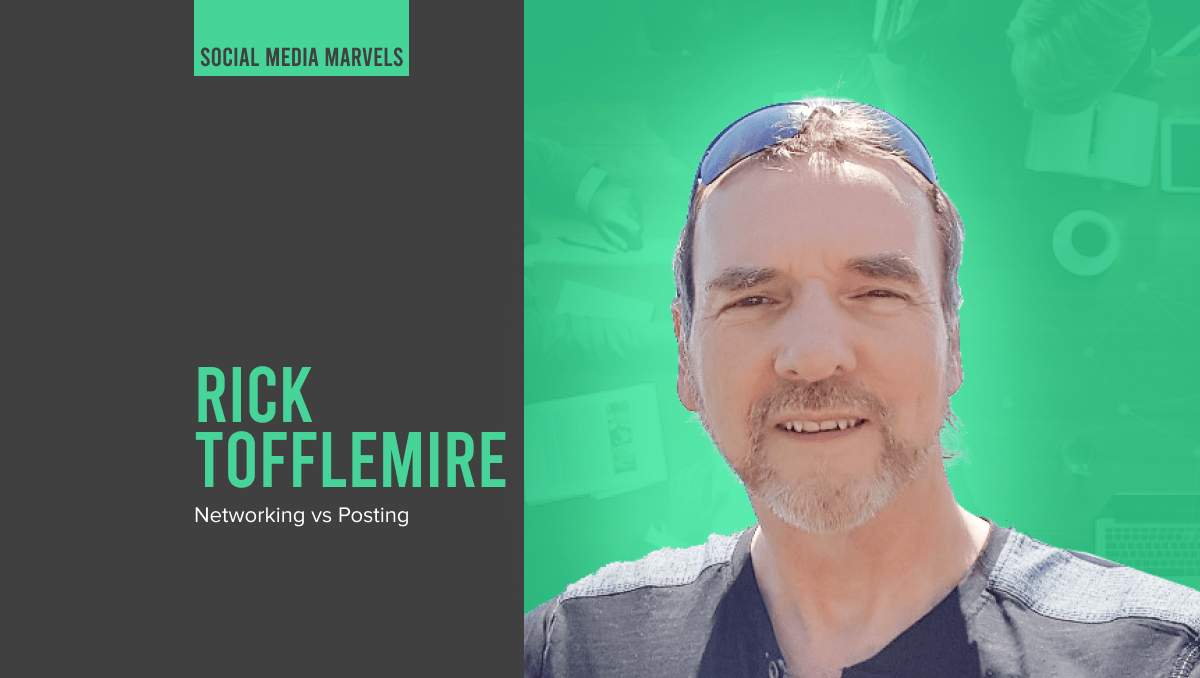The Social Media Marvels welcomes Rick Tofflemire. He specializes in building marketing strategies for real estate clients. We talk about relationship-building, communication, and sharing the right content. He talks about some of the key metrics that a social media manager should keep an eye on.
Find the summarized
What do I Expect from this Video :
- Educating businesses on creating a sound social media strategy
- Key aspects that businesses miss out on while looking into their online presence.
- Managing a community or engaging with customers one-on-one – which route to choose?
- Real estate as an industry example for social media strategy and audience affinity.
Q – So tell us how did digital marketing and working in the realm of social media begin for you?
A –I started off with digital marketing for my own business. I was always keen towards technology. I felt the future holds rise in the use of smartphones as well as social media. So once, the technology was used to access websites online, I thought to leverage it for my personal business. But as we delved deeper, we started taking on clients locally. We saw how cost effective it could be over the traditional marketing avenues of TV, radio, and newspaper.
Q – Are your clients from any specific industries?
A – Yes, we predominantly managed local restaurants, not bigger chains though. All of our clients are patrons, have been with us since a decade. But I’ve stopped managing a lot, since it’s too much work. Especially in the restaurant industry. I’ve discovered that the real place to go with this is in training. You can reach a lot more people and show people how to do this.
Q – So you believe in teaching over managing? And how does it help nurture social media managers?
A – Like I mentioned – I’m more towards training over managing. Since managing takes a lot more effort and one can’t really justify it. If you teach them how to do it, then you are free to discover more about social media. Once, the industry is better educated, they still tend to hire social media managers. The difference being – both of them are now better educated.
Currently, there are a lot of misconceptions around social media managers. Businesses feel all they do is click a few pictures and post it online. But the work that goes behind in terms of hiring the right photographer, editing, etc is overlooked. The amount of skills and efforts that go behind a single post is underwhelmed.
All entrepreneurs can’t acquire all the skills. So they hire social media managers who handle social media well, but have no idea on driving traffic to the website, building relationships, or networking that can benefit the business.
That’s where we come in. The education and weeding out the social media managers who want to make a quick dollar and not create real impact.
Q – What are some of the key aspects of social media marketing that businesses miss out on?
A – We, as digital marketers or social media managers should always be looking at the bigger picture. Being focused just on posting on social media and ignoring the analytics, tends to happen more often than not. They’re not looking at the traffic. When asked what is being done about traffic, they don’t have a clue. Being involved in activities that drive traffic is one of the main things I focus on.
We work a lot with real estate. With real estate, I’ve observed what is driving traffic is great content. Writing blogs, articles, sharing it, building a network online. On a typical website, we can drive up to 60% of traffic, for a real estate agent. Whereas your industry standard is like 4%.
We’re driving more traffic to the website than organic searches, direct, anything else. And you know how Google works. The more traffic a site has, the higher it tends to rank on the SERPs. Besides those other factors like time on site, number of hits to the site and page views also affect the rankings. We focus on those 3 as well with real estate.
Because Google loves your website, your visibility increases. So our focus areas helps our brand partners and websites rank better.
Q – Which one would you prefer as a strategy for brand building – Building an engaging community or personally engaging with your customers?
A – All aspects are interrelated. But if I had to start with one, it would be customer engagement. When it comes to building relationships, networking one needs to add a personal touch. Once you start acknowledging the contributions of your customers, they become ambassadors for your company.
Besides acknowledging their comments personally, give them an elevated status by featuring them in your customer testimonials. Appreciation and recognition are key to building long-term relationships.
With a strong customer engagement, building a community becomes easier, and relationship building ensures brand loyalty.
Q – Any social media trends which you find might not be here for the long-haul? Or is not a trend that should last?
A – Automated communication. Bots that respond to your post share or mention. These sort of automated responses are something, I think, should go out of trend. It doesn’t seem authentic. They seem to distance the audience from the brand.
For example, if I appreciate the brand’s content, and give it a social mention. These automated bots throwing in a thank you is what I don’t like. The brand has not seen the mention, is never going to see it either. The generic response undermines the efforts of the person behind the social account.
Getting automated emails or using auto-schedulers are something which I understand. They serve convenience and better tracking. But when it seeps into social media communication, I see a disconnect.
One trend I appreciate that might aid communication is video content. Once a company is ready to put a face to the brand, it is opening more doors for the customers to reach it. So this is a trend I’d like to see stay in the long-term.
Q – What are some of the marketing strategies you apply to the real estate industry?
A – The 2 strategies we depend on are content and social media. Our objectives depends on the kind of content we produce. We diversify it based on the intent of the customer. Not everyone is looking to buy or rent a home, but they are looking to renovate, mortgage, landscape, decorate. This way we produce content that is informative and easy to consume.
Besides writing content for our clients, we also get guest blogging requests to post to associated industries. For example, guest blogging for a company doing renovations.
Production is one aspect, distribution is another. We share it our website, through social media. That’s how we build traffic on the website. Traffic is one of our primary objectives. Distributing via social media brings a lot of traffic to our clients’ website. The numbers are around 50% traffic from social media itself. These figures are higher than the industry numbers.
Real estate is a vast industry, the players are not investing in the right resources to leverage its growth yet.
Jagruti – Yeah. Because home selling or real estate is such a personal need. It’s not a niche, but it’s a personal need. That’s why you can connect with people emotionally. Social media could be your easiest medium to reach people, reach new people and also like you said, reach people from ancillary or tertiary industries which can help each other and create a symbiotic environment for homeowners as well as brokers as well as buyers or people who are a part of the chain.
A – Yes, exactly. It’s just a lot of potential and it’s a big investment. People like to do a lot of research. We give a lot of tips on home inspections articles. That really draws a lot of people to come to the blog, share it. It’s not unusual to get 30, 40, 50 retweet sometimes on some of the articles we share.
That just creates more brand awareness. Actually, on Twitter we had three accounts on the top 200 Twitter accounts involved in the real estate industry, that’s a lot. There’s a lot of people who are doing this and to reach those numbers, it’s pretty amazing. It’s all the same strategy, content, blogs, sharing this information and we’re always trying to drive traffic.
Q – Getting the right content across social media platforms and passing across information are the key factors to building brand affinity?
A – Yeah. The one missing part there is building an online network. As these people become your brand ambassadors because they love your product, they start sharing more of your stuff and the more they share it, the more followers you get, which creates more traffic. It just keeps on coming.
We do the reverse. They share our content, we engage with them via acknowledgement and share their content too. This act of reciprocacy is what bonds the online network. A lot of people tend to push their content, but don’t share other people’s content.
You need to think about the other end of the bargain as well. You can’t hope to push your content on them and not accept their say in return. With this practice, you can’t nurture connections. You’re not going to really build relationships.
Q – Do you only believe in sharing everything organically or do you believe in sponsored content or paid promotions? Like influencers right now are doing?
A – Actually, we do very little paid promotional content. Everything we do is 99% organic. It’s not that I have anything against paid ads or paid campaigns. It’s just that I see no use for it. My efforts with growing a business lies in building strong networks and relationships. Ads can’t help me there.
It can work with other industries like restaurants or businesses in leisure activities. But with real estate, not everyone is looking to buy a home immediately. They are looking for research, information, and connecting with agents for a future buy. Here, growth lasts on building long-term relationships and ways to nurture. That’s is how you manage to secure a future buy.
The #SocialMediaMarvels is a podcast series that invites digital marketing influencers from across the world to celebrate their journey and get a glimpse of their contributions to the field. Get actionable tips, learn directly from the practitioners, and imbibe it to help your business.



